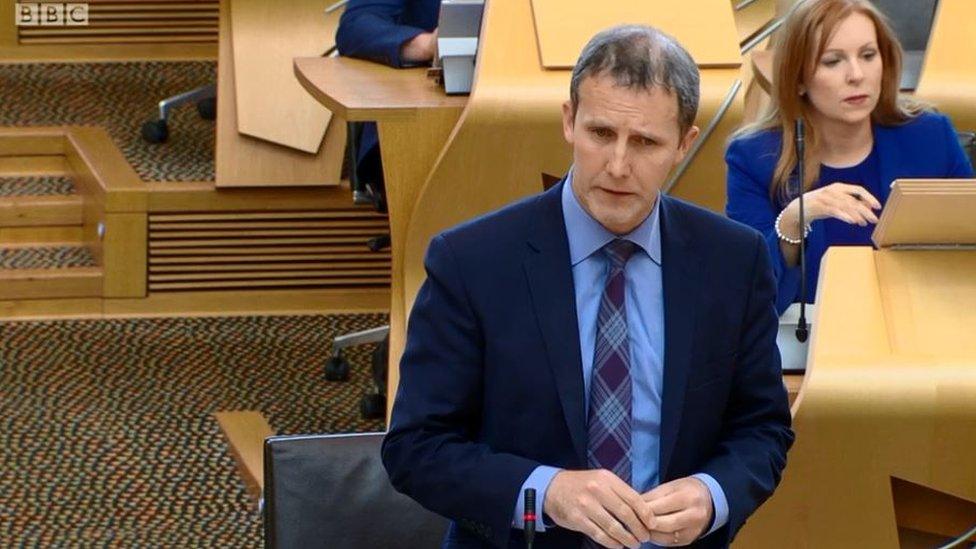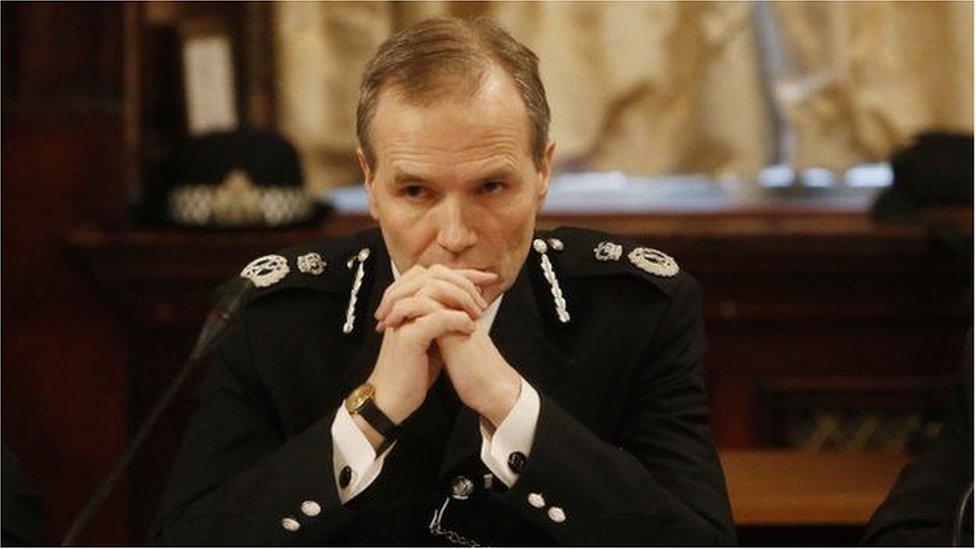Scotland's justice secretary unaware of police report
- Published

Mr Matheson said the internal police report was not given to the Scottish government, and predated his time as justice secretary
The justice secretary has said he had no knowledge of a controversial Police Scotland report until the BBC revealed its contents ahead of a documentary.
Michael Matheson was facing questions from opposition politicians at Holyrood about the BBC investigation.
The documentary showed that corruption complaints and criticisms about the police were removed from an internal Police Scotland report.
Mr Matheson said the report was never given to the Scottish government.
And he said it was a mistake for the force not to have shared it with the Scottish Police Authority (SPA), which is supposed to hold Police Scotland to account.
Opposition MSPs described the revelations as a "scandal" as they suggested that the then-head of Police Scotland had "engaged in a deliberate cover up of allegations of corruption".

Sir Stephen House's office wanted changes made to the report, which had been commissioned by him in 2014
What is the controversy about?
The internal police report revealed by the BBC's A Force in Crisis documentary was commissioned by then-Chief Constable Sir Stephen House in 2014, a year after the creation of Police Scotland.
Drafts of the report show the chief constable's office wanted negative comments deleted, tenses changed to suggest problems had been fixed, and the removal of an entire section where frontline officers described working in a culture of fear.
Early drafts of the report also detailed officers conducting unauthorised surveillance, threatening and intimidating witnesses, unlawfully detaining suspects, colluding while compiling statements and failing to reveal evidence - but these allegations were removed from the final version.
The BBC also obtained an email from within Police Scotland which showed that, as well as attempting to edit the report, Sir Stephen - who left his post in 2015 - indicated that he was prepared to "suppress" it altogether, unless a specific word was changed.
What did Mr Matheson say in parliament?
Responding to questions on when he had first known about the internal report, Mr Matheson said it had only been when the BBC "published information relating to their programme and the fact that they were focusing on this particular report".
He added that the report has not been shared with the Scottish government - it is not something we have a record of having ever received" and pointed out that it was compiled before he became justice secretary.
Mr Matheson said: "It is a report that I do think Police Scotland at that time should have shared with the SPA, so that the SPA had an opportunity to look at these issues, and I think it has been a mistake on their part not to do so."
Reporter Samantha Poling has been investigating Police Scotland
Mr Matheson said many issues raised by the documentary were "historic, legacy-force issues inherited by the single service" and were therefore "primarily for Police Scotland to address".
The SPA is now seeking "urgent assurances" from police chiefs about the issues raised in the documentary, he added.
But Mr Matheson said allegations of corruption had already been examined by the Crown Office, and added that Her Majesty's Inspectorate of Constabulary in Scotland (HMICS) - which scrutinises both Police Scotland and the SPA - had carried out a review of the force's counter corruption unit, which led to changes being made.
He said that the "important thing here is for the service to move forward" and said "significant progress" had been made in several areas highlighted by the report.
What has been the response from opposition parties?
Tory justice spokesman Liam Kerr, who raised the issue with the justice secretary, told him that: "This is a scandal. and I do not use that world lightly."
Mr Kerr added: "It appears that the head of our national police force has engaged in a deliberate cover up of allegations of corruption, and changed the tenses of other problems to suggest they were already fixed."
Labour justice spokesman Daniel Johnson hit out saying: "What does it say about the organisation's culture and ethos that these were some of the very first acts of the chief constable?"